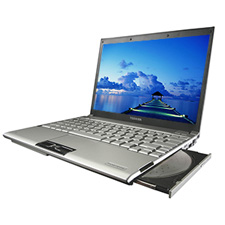How Toshiba's 128GB SSD-equipped Portégé R500 stacks up

Toshiba has released what it says is the first laptop with a 128GB SSD. Technically, the 17-inch Alienware Area-51 m9750 can be configured with two 64GB SSDs, but Toshiba gets credit for shipping the first laptop equipped with a 128GB SSD that you'd actually want to carry anywhere.
 |
| The Portégé R500 is the first ultraportable to offer a 128GB SSD |
| Credit: Toshiba |
The Portégé R500 is available with either a 64- or 128GB SSD, but they don't come cheap. The 128GB SSD adds $900 to the cost of the system. Still that's about the same as (or even a bit less than) competitors such as Apple are charging for 64GB SSDs in notebooks. Toshiba also happens to be the world's second-largest manufacturer of NAND flash, so it makes sense that the company would be increasing capacity and driving down the price.
SSDs are a hot topic because compared to standard hard disk drives, they are more reliable (no moving parts), thinner and lighter, use less power, and theoretically deliver better performance. Though most computer makers now offer one or two models with SSDs, they've been slow to catch on because they are limited in capacity and pricey. The retail cost per gigabyte of a 64GB SSD is $16.40 versus about $0.40 for a standard laptop hard disk drive (2.5-inch 5,400rpm 160GB). So far, the performance hasn't lived up to expectations either.
Here are some of the laptops from major OEMs that offer SSDs. I focused on ultraportable notebooks, most of which are targeted at business users, though there are other mobile PCs out there using SSDs including netbooks and at least one desktop replacement, the gaming-oriented Area-51 m9750. Note that these aren't the starting prices--for the sake of comparing apples to apples, I configured these as similarly as possible to the Portégé R500. (Most include an Intel Ultra Low-Voltage Core 2 Duo processor, 2GB of memory, a 120GB HDD, integrated graphics, an internal or external optical drive, Windows Vista Business, and a three-year warranty.)
| Model | Price with SSD | Price with HDD |
| Apple MacBook Air (13.3-inch) | $3,146 (64GB) | $2,147 (80GB) |
| Dell Latitude D430 (12.1-inch) | $1,937 (64GB) | $1,512 (120GB) |
| Fujitsu LifeBook B6230 (12.1-inch) | $2,518 (32GB) | $2,139 (120GB) |
| HP Compaq 2510p (12.1-inch) | $2,507 (64GB) | $1,828 (120GB) |
| Lenovo ThinkPad X300 (13.3-inch) | $2,920 (64GB) | No HDD option |
| Sony VAIO VGN-TZ2500 (11.1-inch) | $3,375 (64GB) | $2,275 (120GB) |
| Toshiba Portégé R500-S5007V (12.1-inch) | $2,999 (128GB) | $2,099 (160GB) |
| Voodoo Envy 133 (13.3-inch) | Not announced | $2,099 (80GB) |
To get to these higher densities and lower prices, Samsung, Toshiba/SanDisk, Intel/Micron and others are shifting from SLC (single-level cell) NAND flash to drives that use two-bits per cell (MLC) memory. The catch is that MLC NAND doesn't offer the same speed or durability (the number of write cycles) as SLC NAND, so these higher-capacity PC SSDs require very sophisticated controllers to deliver acceptable performance.